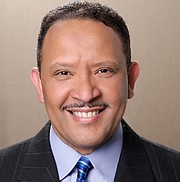Russia’s sabotage of U.S. elections
Marc H. Morial | 8/2/2018, 6 a.m.
“It’s undeniable that the Russians are taking the lead on this. Basically, they are the ones that are trying to undermine our basic values, divide us with our allies. They are the ones that are trying to wreak havoc over our election process. We need to call them out on that. It’s critical that we do so, and then take steps to make sure that they are not able to do this with an election coming up ...” — Director of National Intelligence Daniel Coats, July 19, 2018.
We don’t yet know — and perhaps may never fully know — to what extent Russian efforts to sabotage American elections succeeded. What we do know is that, in addition to waging a massive disinformation campaign on social media, Kremlin-backed hackers:
• Accessed private email accounts,
• Stole personal information on at least 500,000 voters from a state election website,
• Visited other state websites to identify vulnerabilities and
• Infiltrated a voter registration software company and disseminated malicious software to Florida county election officials.
We also don’t know to what extent any Americans cooperated with Russians in these crimes. We know that the Trump campaign was at least willing to consider accepting opposition research from people known to have ties to the Kremlin. We know a congressional candidate asked for and received damaging stolen information on his or her opponent.
Most importantly, we know that Russia continues its efforts at sabotaging our democracy and little or nothing is being done to stop it.
Protecting the integrity of our democratic process should be the top priority of our elected officials. Instead, the president openly contradicts the assessment of American intelligence and the House of Representatives eliminated new funding for states to strengthen election security.
The arrest of Russian operative Maria Butina, who forged close alliances with the NRA, raises questions about whether Russian money was illegally funneled to political candidates through that organization — and whether those candidates are Congress members who may have motive to thwart such an investigation.
Shortly after the inauguration of Mr. Trump, I noted that because his elevation to the office was by way of the anachronistic Electoral College, and not the will of a majority of voters, he owed the American people an exceptional level of deference.
Instead, he repeatedly has shown deference to the architect of the sabotage, lending validity to Vladimir Putin’s discredited denials and refusing to acknowledge the conclusion of the intelligence community that Russia has interfered and continues to do so.
In his farewell address, President George Washington warned “against the insidious wiles of foreign influence.” He wasn’t speaking in the abstract. France was actively trying to influence the American election in favor of Thomas Jefferson, who championed France in its conflict with Great Britain. France’s attempts backfired, however, as voters viewed Jefferson’s party as pawns of the French government.
James Madison wrote to Mr. Jefferson just before the 1796 election that France’s scheme was “working all the evil with which it is pregnant.” Mr. Jefferson lost to John Adams, who supported France’s rival Great Britain.
Almost as though he could foresee our present situation, Mr. Washington said in his address, “Real patriots who may resist the intrigues of the favorite are liable to become suspected and odious, while its tools and dupes usurp the applause and confidence of the people, to surrender their interests.”
We will not surrender our interests.
For African-Americans, the right to vote is sacred. The men and women who died in the bloody battle for black suffrage — heroes such as the Rev. George Lee, Medgar Evers, Jimmy Lee Jackson, James Earl Chaney, Andrew Goodman, Mickey Schwerner and Viola Liuzzo — are nothing less than martyrs. Inaction in the face of election sabotage is an affront to their memory. It is sacrilege.
The writer is president and chief executive officer of the National Urban League.







